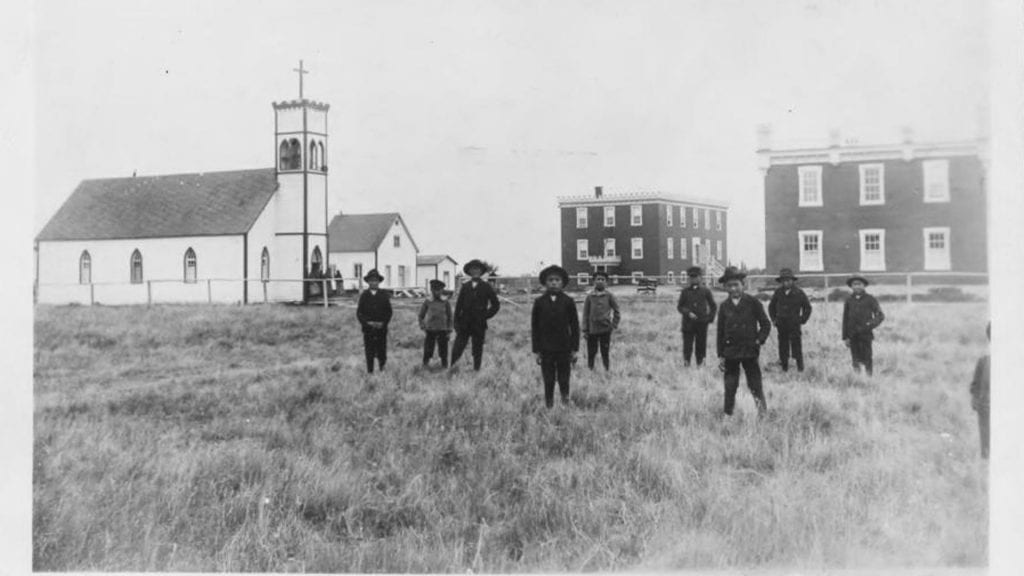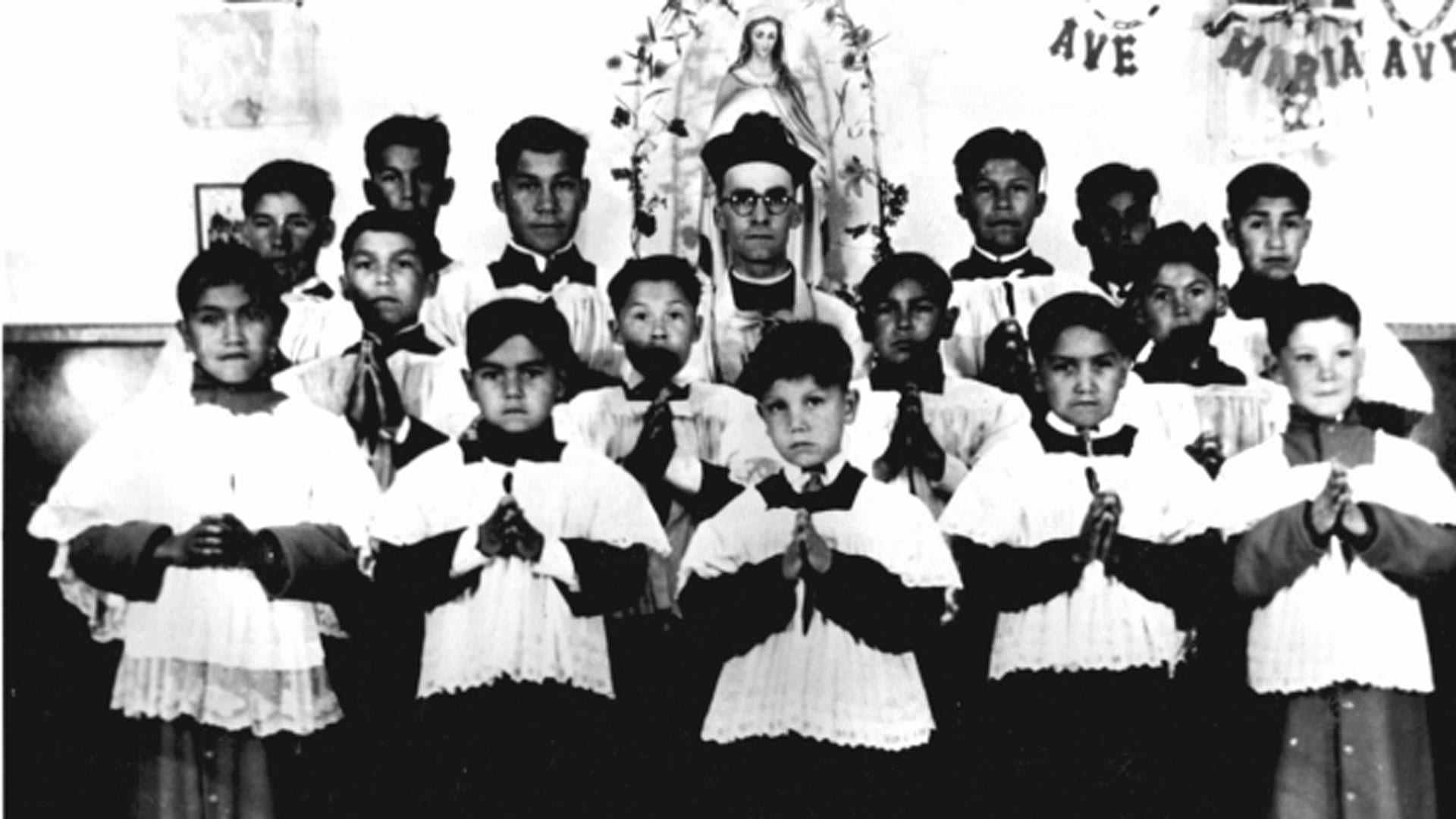
Boys stand outside of St. Anne's Residential School in 1945. Photo: National Centre for Truth and Reconciliation
Three people who survived the notorious St. Anne’s residential school on the James Bay coast in Fort Albany, Ont. are fighting to have their case stay in Ontario after a judge recused himself and passed it over to B.C. in June.
The survivors say the federal government suppressed thousands of documents that, had they been released, might have qualified them for inclusion in the 2006 Indian Residential School Settlement Agreement (IRSSA). They want their Independent Assessment Process cases reopened, but Ottawa wants the bid tossed out.
One survivor, named only as Claimant T-00185, was denied compensation in 2010 and wants access to the records. In 2014, the court ordered Canada to start producing these documents and others.
The Ontario Court of Appeal, which reserved judgement after hearing submissions on Monday, must decide where those hearings will take place before the main issues can be sorted out.
“St. Anne’s is quite different from other residential schools. It’s the only residential school so far where there have been allegations and there’s been directions by a court to state that Canada has not fully complied with its disclosure obligations under the Indian Residential Schools Settlement Agreement,” Stuart Wuttke, a lawyer with the Assembly of First Nations (AFN), told the court via Zoom.
AFN is a party to the settlement agreement and argued the case should stay in Ontario.
“This is an outlier,” continued Wuttke. “It doesn’t have precedential value for other jurisdictions or other Indian residential schools. It really is quite confined to St. Anne’s itself, an Indian residential school whose occupants were from Ontario. The school itself was in Ontario.”
The survivors appealed after Ontario Superior Court Justice Paul Perell recused himself from hearing the initial request to have compensation cases reopened. Perell oversees implementation of the settlement agreement in eastern Canada and has been involved with the class-action for 13 years.
Perell explained on June 5 that his decision to recuse stemmed from a 2018 case litigated by one of the survivors’ lawyers, Fay Brunning.
Perell ordered Brunning to make her final submissions after she threatened not to attend a different Independent Assessment Process hearing until appropriate disclosures had been made.
Perell thought Brunning’s conduct sanction-worthy and found her liable for costs, saying she “failed to fulfill her obligations to the administration of justice.”
On appeal, a different Superior Court judge decided that, having ordered her to attend, Perell should have recused himself then from the decision to sanction her.

In the interest of “judicial economy and efficiency,” Perell explained that Supreme Court of British Columbia Justice Brenda Brown, who oversees the settlement agreement in the west, should hear the case instead.
The machinery of the settlement agreement is being dismantled, meaning the survivors’ case must be heard on an “urgent basis,” he explained.
If not Brown, an Ontario judge less experienced with the residential schools settlement will have to preside.
Queen’s Park intervened in support of the survivors, arguing Perell had stepped outside of his jurisdiction in pursuit of efficiency.
“Our submission is that the Superior Court of Justice exceeded its Constitutional jurisdiction in directing Ontario residents, who have properly brought a claim before an Ontario court, to take their dispute to the superior court of British Columbia,” Ontario’s lawyer Estee Garfin told the court.
“Unfortunately, the advantages of the B.C. judge’s familiarity with the IRSSA cannot grant jurisdiction where it does not already exist.”
Canada disagreed, arguing that the decision to hand the case to Brown in B.C. falls within the framework of the settlement agreement.
“Ms. Brunning is seeking to have the matter heard by another Ontario Superior Court judge, outside of the court designated process, following Justice Perell’s decision to recuse himself from this matter,” said Crown-Indigenous Relations in a statement.
“All claims filed by survivors of St. Anne’s Indian Residential School have now been resolved through the Independent Assessment Process, with 96% of these claimants having received compensation,” the statement added.
Read More:
Two former residential schools to become national historic sites
The survivors’ lawyers also raised concerns about publicly attending a court hearing because of the ongoing threat of the COVID-19 pandemic.
First Nations communities along the James Bay coast went into lockdown last week after someone tested positive for the novel coronavirus on Moose Factory Island.
The court said the hearing would be “notionally held in Vancouver,” while people could attend remotely from anywhere.
“This mode of proceeding will address the travel and safety concerns of the Requestors and others,” said Perell.
The merits of the underlying case were not discussed on Monday.
In a past ruling, Perell called St. Anne’s “the site of some of the most egregious incidents of abuse within the Indian Residential School system.
“It is known, for example, that an electric chair was used to shock students as young as six years old. It is known that the staff at St Anne’s residential school would force ill students to eat their own vomit.”
Between 1992 and 1996, the Ontario Provincial Police (OPP) investigated St. Anne’s and produced roughly 992 signed statements from up to 750 people detailing some of the abuse.










